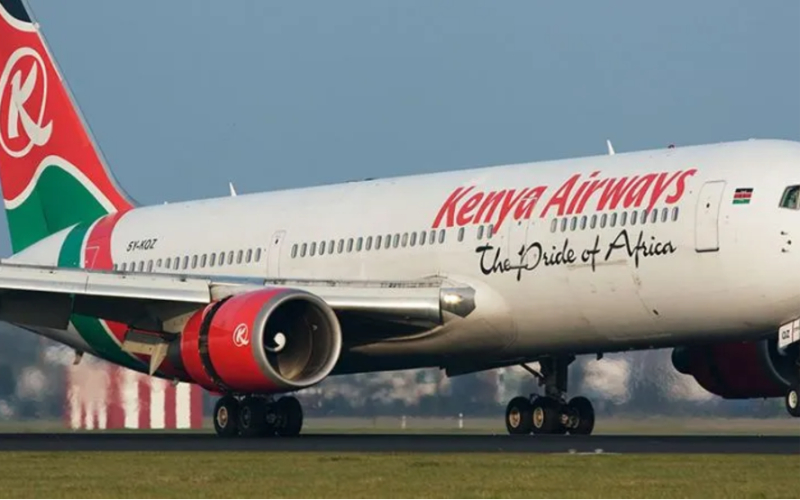More than 12,000 travellers stranded as KQ pilots strike

The Kenya Airways (KQ) pilot strike entered its second day yesterday, leaving travel plans for more than 12,000 travellers in disarray, even as the government and the airline officials scrambled to bring the crisis to a quick end.
Both the Transport Ministry and the airline have described the industrial action as illegal and warned the striking members of the Kenya Airlines Pilots Association (KALPA) the strike was not protected by law.
Last week, the Labour Court declared the strike illegal and has ordered both KQ and KALPA to appear before it tomorrow for further directions.
By yesterday, more than 500 passengers had been booked into various hotels after their travel plans were disrupted. Only three flights—one to Addis Ababa, Ethiopia, another to Entebbe in Uganda and Mombasa—took off from the Jomo Kenyatta International Airport (JKIA), according to KQ.
KQ may not pay November salaries
Allan Kilavuka, the airline’s CEO, warned the strike will make it difficult for the company to pay November salaries.
Roads, Transport and Public Works Cabinet Secretary Kipchumba Murkomen last evening hinted that the government would dismiss the striking pilots in line with the labour laws.
Kilavuka, too, said striking workers will be subjected to disciplinary action in line with the company’s human resource policy.
Murkomen’s pronouncements mirrored that of the airline’s management, who on Saturday had issued an ultimatum to the pilots to resume work at once, failure to which they would be dismissed for violating the industrial court order to cease the strike.
Some of the pilots heeded the warning, with KQ last night saying it would operate scheduled flights to Entebbe, Mombasa and Lusaka in Zambia.
While conveying the government’s apologies for the strike, which by Saturday had affected over 10,000 passengers after 53 flights were cancelled, Murkomen said there have been relentless, but so far futile efforts by the government, to resolve the dispute.
“Considering the defiance of KALPA and their total disregard for the existing court order — which is at the heart of the rule of law — the Ministry of Labour now has to activate the procedures governing industrial relations,” said Murkomen in a statement.
He urged the striking pilots to be mindful of the consequences of defying a court order and to urgently return to work “because impunity cannot be an option”.
Defying court will lead to sackings
On Saturday, KQ’s Chief People Officer Tom Shivo gave an ultimatum to the striking pilots, warning them to resume work, failure to which they would be dismissed for disobeying a court order.
“Pilots not reporting on duty will have defied court orders, meaning they will be guilty of contempt,” Shivo said. “Secondly, they will have disobeyed lawful orders issued by management.”
This, Shivo warned, could result in dismissal.
A further staff memo by the KQ management issued on November 4 described the planned strike as unlawful, with the Director of Operations, Paul Njoroge, advising all pilots to observe their published rosters.
The Employment and Labour Relations Court sitting in Nairobi issued an injunction against the strike notice on October 31, making the industrial action unlawful. This notwithstanding, the pilots still went ahead with their strike on Friday.
In calling the strike, KALPA officials said members of the association wanted their retirement benefits reinstated and their conditions of work improved in line with the Collective Bargaining Agreement (CBA). They raised four key grievances, including accusing KQ management of hiring incompetent workers. They also demanded that the top managers and all board members be replaced.
In response, KQ told the pilots to give management space to run the company and focus on the issues that needed to be resolved. The management also warned that action would be taken against those who strike.
Tough talking Murkomen
The pilots, however, ignored the ultimatums and dug in, a position that has forced KQ’s management to engage other airlines to take over some of its connecting passengers, even as it seeks a lasting solution to the challenge at hand.
Yesterday, Murkomen said although the government respected the workers’ rights and the role of KALPA as a representative of the pilots in agitating for better terms, “this must be done within the confines of the law and must take into consideration the prevailing economic circumstances both in the company and the country.”
On Friday, Kilavuka indicated that the strike would cost the airline at least $2.5 million (Sh300 million) per day.
The financially troubled airline has been flying in turbulence for a long period. Although it cut its losses to Sh9.9 billion in the first half of the year, from Sh11.5 billion during the same period last year, Murkomen said it has taken the effort of the government to prop the airline up by “injecting more than Sh60 billion to keep the company afloat” in the last three years.
The CS said before the strike, the government had assured KALPA of its willingness to negotiate.
According to Murkomen, President William Ruto’s administration has been working on a plan to turn around the airline, a plan he said was contingent on the capitalisation of the airline and nurturing it back as a listed company at the Nairobi Securities Exchange (NSE), efforts he feared will be impeded by the strike.
He said the government, through his ministry, was ready to tackle the problems that have plagued KQ for a long time.
“Instead of glossing over and whitewashing the deep-seated problems at Kenya Airways we believe that time has come for us to confront and resolve these problems once and for all,” he said in a terse statement.
Yesterday, some of the stranded passengers who spoke to the People Daily lamented how they would suffer losses after missing their flights and wondered if KQ would compensate them.
The airline has booked foreigners in city hotels while asking Kenyans to go back to their residences as the airline made efforts to get them seats on alternative airlines. Yesterday, KQ created tents at the Jomo Kenyatta International Airport (JKIA) to sort out the stranded customers.
“I had booked Kenya Airways, but have been forced to book again on the Turkish Airline, which is slightly more expensive, to connect to the Netherlands,” said Lucas Choi, who said KQ had implied it would refund the extra cost.
And in what is likely to worsen the situation further, the Kenya Aviation Workers Union (KAWU) said they would join KALPA by going on strike as well.









